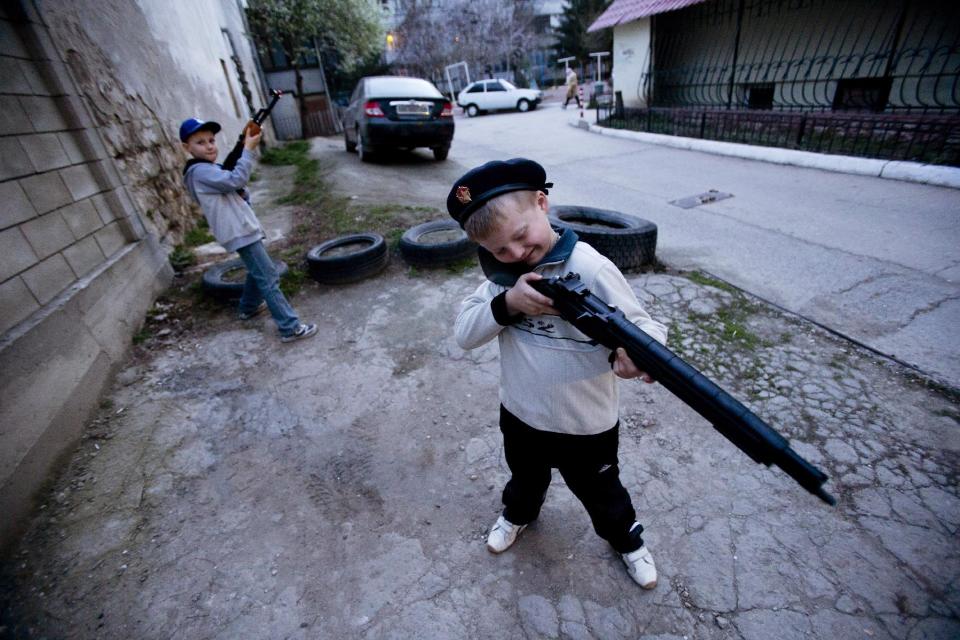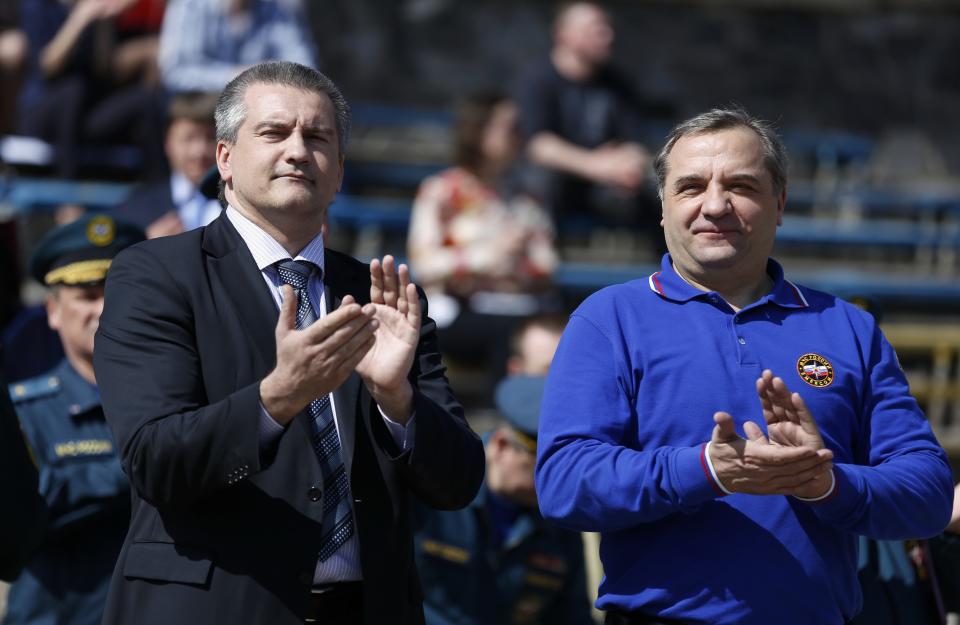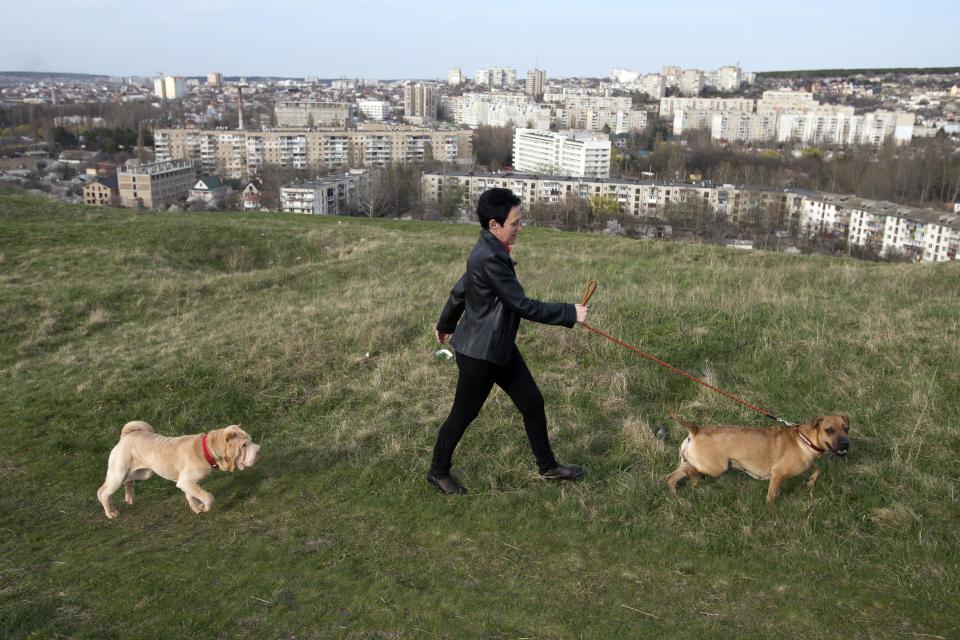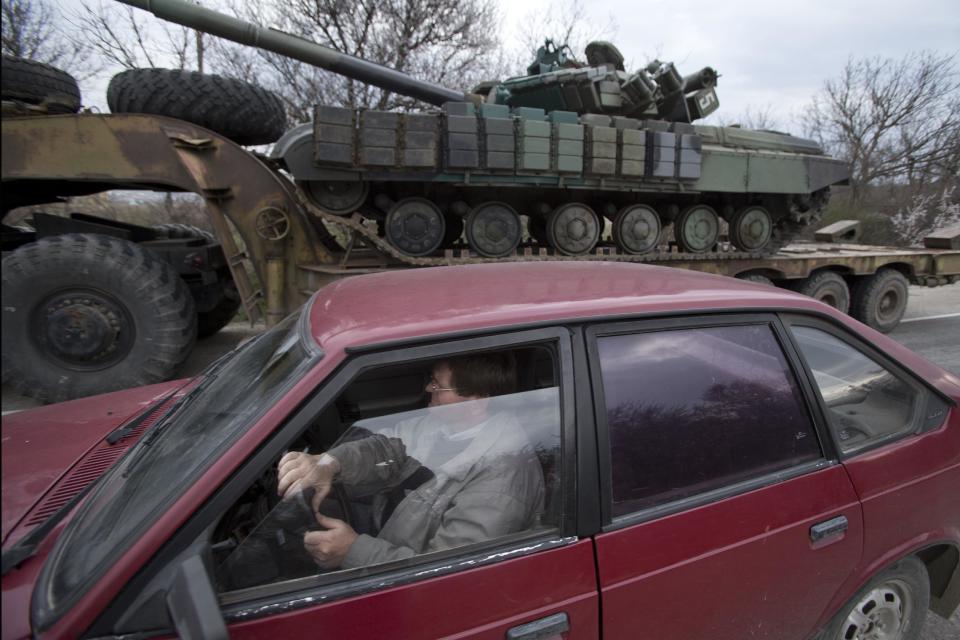Crimea besieged by Ukraine control of power, water
SIMFEROPOL, Crimea (AP) — Within days of Crimea being swallowed up by Russia, the lights began flickering out.
Officials in the peninsula accused Ukraine of halving electricity supplies in order to bully Crimea, which voted earlier this month in a referendum to secede and join Russia.
"Cutting supplies is an attempt by Kiev to blackmail Russia through Crimea," Crimean Prime Minister Sergei Aksyonov wrote on his Twitter account.
Aksyonov's combative reaction reflects a sobering reality for Crimea: the strategic peninsula's overwhelming reliance on electricity and water supplies from mainland Ukraine. The Kiev government, which has been unable to prevent the Russian annexation, still wields a weapon it can use to bargain with its aggressive neighbor.
Crimea currently gets about 80 percent of its electricity and a similar share of its water needs from Ukraine.
But Ukraine also needs to be careful not to hit Crimeans too hard over electricity and water. It cannot afford to be seen hurting ordinary people as it argues that the region remains part of its territory.
Analysts say that Ukraine will likely be able to charge higher prices for power and water supplies to Crimea, but won't get any leverage on political and security issues.
Ukrainian authorities have described power cutoffs to Crimea this week as simply the result of technical maintenance and insist they would do nothing to harm residents. Russian officials have rushed to the rescue with hundreds of diesel generators and started drafting plans to connect the region's electrical grid to mainland Russia, which is separated from Crimea by the Kerch Strait. They said a possible water shortage could be offset by more efficient use of existing resources.
Those reassurances have provided little comfort to Filipp Savchenko, the 29-year-old owner of a refrigeration and logistics business in Simferopol, the Crimean capital. Savchenko said Tuesday that the power had been out for two nights at his warehouse, where he stores about $9,000 of produce daily for his clients.
"With the help of the generators we have, we were able to survive," Savchenko said. "But if they turn (the electricity) off in the future or for longer, we won't be able to cope. We'll lose our produce and business owners will have legal issues with us."
Regardless of the intention behind the recent blackouts, they have underscored Crimea's dependency on mainland Ukraine. They also highlight its lack of a real contingency plan if Kiev does decide to pull the plug. Russia's long-term projects could eventually snap Crimea's reliance on Ukraine for good, but that could take years.
Russia's Prime Minister Dmitry Medvedev said this week that a quick solution for the power problem could be to use a transmission cable to hook up the peninsula to Russia's power grid across the Kerch Strait, which is 4.5 kilometers (2.8 miles) wide at its narrowest point.
Russia has dispatched diesel generators, including some big units used as a back-up during the recent Sochi Winter Games. Russian Emergency Situations Minister Vladimir Puchkov said Tuesday that his agency had already delivered 1,400 diesel generators to Crimea.
For the longer term, the Crimean regional government has pushed the idea of building two power plants on the peninsula. Ambitious infrastructure projects in Russia are typically blighted by major overspend and corruption.
Irrigation has long been a headache for Crimea, and could become so again, should Ukraine choose to apply pressure by closing off the Soviet-built canals fed by the Dnipro River, a major waterway that streams through the heart of the country. The canal system that feeds Crimea was built only after the peninsula was transferred in 1954 by Soviet leader Nikita Khrushchev to his native Ukraine.
Deputy Crimean premier Rustam Temirgaliyev has grimly acknowledged that the peninsula has not to date found any alternative to water supplies from the Dnipro.
But Dmitry Kirillov, the head of water resources department at Russia's Natural Resources Ministry, said that Crimea's potential water problem isn't that threatening. He argued that the agricultural sector accounts for the bulk of the region's water consumption, and a possible water shortage can be overcome simply by stopping the cultivation of some crops, such as rice, and focusing on traditional winemaking.
Adversity for the peninsula may prove an opportunity for Ukraine, which is already signaling its intent to withdraw some of the state subsidies for essential resources that have kept prices relatively low.
Sergei Sobolev, head of the parliamentary faction of the Fatherland party, whose leading members now dominate the government, has argued that special tariffs should be established for power and water supplies to Crimea.
The need to raise funds for Ukraine's cash-strapped treasury will prove particularly acute against the backdrop of reported Russian plans to increase the price of natural gas to $405 per thousand cubic meters. Late last year, Russia agreed to help prop up the teetering government of now-ousted President Viktor Yanukovych by selling Ukraine gas at $268.50 per thousand cubic meters, but it has recently announced a decision to scrap the discount.
"We have no intention of subsidizing citizens of the Russian Federation: the occupiers that have now deployed their armed contingents on temporarily occupied territory," Sobolev was cited as telling parliament this week by the UNIAN news agency.
Sobolev said that prices for gas and electricity in Crimea are priced four times below market cost and that water is provided at one-seventh of its real value.
Vladimir Omelchenko, an energy analyst at the respected Kiev-based Razumkov Center think tank, said Ukrainian companies will now charge prices that would bring a profit. He said it would be unrealistic to expect that Ukraine could win security guarantees from Moscow or persuade it to return the Ukrainian military equipment seized in Crimea.
Alexander Konovalov, the head of the Institute of Strategic Assessment and Analysis, an independent think-tank, said that Ukraine could potentially profit on its current monopoly on providing power and water supplier to Crimea. But he added that Moscow's refusal to engage in a dialogue with Ukraine's new government was hampering any meaningful dialogue.
"To start bargaining, you have to sit down for talks," Konovalov said. "And Russia has said the (Ukrainian) government is illegitimate."
Either way, many of the Crimeans who have supported the Russian annexation remain confident Russia will come to the rescue if matters get any more serious.
"We've lived through this before, I'll just go and buy some candles," said Olga Dusheyeva, an 81-year-old former math teacher. "I'm not scared, I know that Russia will always help us."
______________
Associated Press writer Yuras Karmanau in Kiev, Ukraine and Vladimir Isachenkov in Moscow contributed to this report.







